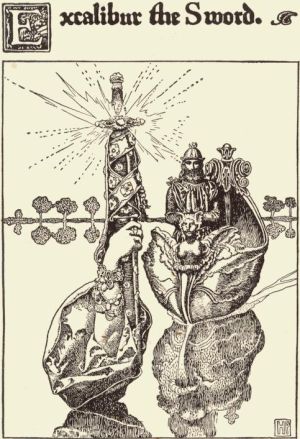Yawn, Another +1 Sword
How to Make Magic Items More Wondrous
by Joe Wetzel (joewetzel at gmail dot com)

“Excalibur the Sword” from Howard Pyle’s The Story of King Arthur and his Knights.
Excalibur (King Arthur’s sword). Mjolnir (Thor’s hammer). The One Ring (Lord of the Rings). These are memorable items because they are unique and they have a story. They were created for a reason and the people who used them needed the items for some great purpose.
While only the most minimal magic fantasy campaigns can have a backstory for each magic item the characters find, only the most magic rich campaigns should have basic magic items such as a simple +1 Sword or Leather Armor +2 or even a no-frills Bag of Holding.
The key point is that someone went through a great amount of trouble to create a magic item for a reason. When that person decided what to create, he had a purpose in mind. While a basic +1 sword or a Wand of Magic Missiles is useful and neither will go unused until the group is much more powerful, the item’s purpose should impact its powers more profoundly.
An item with a basic purpose and some additional specialized power would cost less to create than an item with a major, general purpose or an item with multiple general purposes. Therefore customized magic items are more likely to be created.
When considering these points for your campaign, two approaches make sense. In some cases you may want to create the backstory first and select the item’s magical properties to fit the story. In other cases (and probably more often for a reason mentioned below) you can think of a couple of interesting magical properties to add to an item and then develop its backstory.
In an example using the first approach, you might decide that a castle was under attack by an undead army. As the forces of good were losing, the bishop and other priests who were in the castle under seige enchanted a number of Maces. These Maces not only were +1 to hit, but the wielder was also granted a +4 bonus to his Turn Undead check.
In the second approach, you might think that a +1 Warhammer might be a good thing to find in a Dwarven mine. But to make the magic item more unusual, you decide to give it another power such as its wielder gains a +2 total bonus when making attacks using the Cleave feat. A time-saving reason to use the second approach is the GM doesn’t have to develop a backstory every time, he can just improvise it on the fly or with minimal notes and then develop a plausable backstory later if it is needed. Sometimes even if an item’s powers are unrelated the backstory is even better because it needs to be very creative.
In the Warhammer +1/+2 Cleave example, the backstory can be developed later and lead to further adventures. Perhaps when the Cleave ability is used runes appear that give the name of the long-dead Dwarf it was made for, or maybe someone recognizes it as that Dwarf’s warhammer. As the wielder uses it, he starts having bad feelings… some research may show that the Dwarf was never properly buried and his spirit needs the body to be buried to move on.
While the above examples include additional powers for weapons, they could be added to any magic item. However, some magic items aren’t a good conceptual fit for certain powers. For example, a magical quiver shouldn’t have anything to do with improving melee attacks unless there is a very good backstory.
Below is just a partial list of powers that could be added to magic items:
- Improves intiative.
- Improves attack bonus against a particular creature type.
- Improves damage bonus more than the attack bonus.
- Improves a saving throw.
- Improves a feat.
- Improves a class ability. For example, a magical Dagger may add a d6 to Sneak Attacks.
- Makes bearer immune to a particular (or related set of) poision.
- Wearer will not bleed.
- Item also has a spell-like affect (for example detect undead) a limited number of times per day.
- Vastly improves a saving throw against a specific spell or situation.
- Item glows when a creature type is nearby.
Another way to generate magic item ideas is to look at other magic items and combine the effects or add a lesser version of an effect. For example, add a Chime of Opening’s effect to a Hammer that activates that effect when knocked on a door.
One other way to make magic items more interesting is to give them an interesting description. Too often in campaigns a creature is defeated, a spellcaster casts detect magic, sees that a sword is magical, then casts identify, learns that it is +1, and finally a character claims it and puts “Sword +1” on his character sheet. But the magic item should (in most cases) have something special about it. Maybe it is simply untarnished, maybe it has runes on the hilt, maybe it is exceptionally will balanced, maybe it is made of a special alloy. Whatever sets it apart, the magic items usually have something that makes them different to the casual eye unless the item was meant to be hard to find. Note these facts when describing the item when it is found. Yes, these notes will tip the players off, but their characters would see that these items are exceptional or at least unusual.
Finally, all of these suggestions might get difficult to track. One way to solve this is to make up two index cards for each magic item: one that has all the information (for the GM) and one that has what the players know. Place a code on the index card (even if it is just a sequential number) so the GM can later know that the item has an undiscovered power that should be revealed or used. This will track who has the item and help the GM to reveal and use the appropriate powers. However, don’t go too long without revealing all of the powers or the administration can become nearly impossible.

This work is licensed under a Creative Commons Attribution-Share Alike 3.0 License.

Oh, yeah. This is my kind of stuff.
I once gave somebody a sword, a scimitar, that had the pattern of a snake skin on the blade. The cool thing was, if you were evil, the pattern was predominantly black; if you were good, predominantly white; blue for neutral. This gave the characters a somewhat odd way to check out the souls of people they met, though it required a bit of character diplomacy.
Another weapon I had greatly increased the strength of the wielder (set it at human maximum), but would swing wildly, striking at nearby inanimate objects once per round.
Yet another one was a returning blade that had the habit of appearing in your hand any time somebody wished to do you bodily harm– even if a better weapon had to be shoved out, and even if you were asleep. (It would wake you up, though, so it was pretty useful.)
And of course one character found a glass wine bottle full of fire. Cool to the touch, and well-nigh unbreakable, it made a good sap,(damage like a small club unless you have stats in your game for a bottle.)which could easily be smuggled into “no weapon” places, and an excellent torch. It also makes a handy water-(or wine!) bottle, which flavored the water with a strong, fizzy cinnamon. You could even fool some people into thinking it might be acid.
My favorite trick (as you may see) is to make a weapon more interesting by making special abilities slightly inconvenient, or to give extra powers that will only be conveniences, rather than combat bonuses.
I was once tudored by a friend of mine (who was GM quite often) about the prevailance (sp?) of magical items. His train of thought (and soon, mine as well) was that a Long Sword +2, is not necessarily magical…. it might just be of fine balance and edge… or it might be of a hardened material or exceptional craftsmenship.
A Long Sword +2, +4 vs Undead (to use an earlier example), might simply have been an exceptionally well crafted sword that was blessed by the biship of a nearby large city (ergo, a relatively powerful cleric) and given to someone specific. Not necessarily ‘magical’.
However, a Long Sword +2, +4 vs Undead Flamestrike (YES, I made that up) that shoots a ‘Burning Hands’ effect for 3d8 once every 6 combat rounds, should be extremely rare, IMHO. I often played the world of Krynn with 2nd Ed AD&D, and had a fellow who ALWAYS made a fighter / paladin of sorts and ALWAYS seemed (at level 1 creation) to have a 2 handed Bastard Sword of +4, +8 vs Evil with the gift of Life Touch (resurrection) or Lightning Strike twice per day as per the Chain Lightning spell, and it was ALWAYS handed down his family tree originally from his great great (etc etc) grandfather, High Lord Knight of the Rose (insert famous Knight line of the world here) Gunthar Something or other.
It always amazed me how he was the only son of the only son (etc etc) of Great Grand Knight Father Gunthar whats’his’face.
The point is… the original author is right, Magic items should be rare. If everyone has one, what’s the point of having them at all? However, exceptionally crafted weapons might be while uncommon, not necessarily rare, and definitely not ‘magical’.
Wow! Thanks for this fantastic post! I have printed this and added it to my DM’s Notebook. Obviously this takes a little extra prep work, but I have always been in favor of giving less treasure and making everything that the player’s get have a story behind it. Maybe this will encourage my groups to not just sell off everything so quickly. Thanks again for posting this!
I’ve run several campaigns in the past. Not one of them had lots of magical items in it. Also, nearly all the magical items gained by players wre created with a perpose in mind. This stops players “collecting” magic. It leaves the players character with greater memories for completing the task required and even terminates the need for the item after the quest has been completed. I fould those players who always chose particular items were book lawers who never particularly added anything to an adventer be being in it and often drifted off to some other poor unfortunate.
Players who fall into this stigma are often victims to themselves. They search for something in a campaign that, to be blunt… They will never achieve.